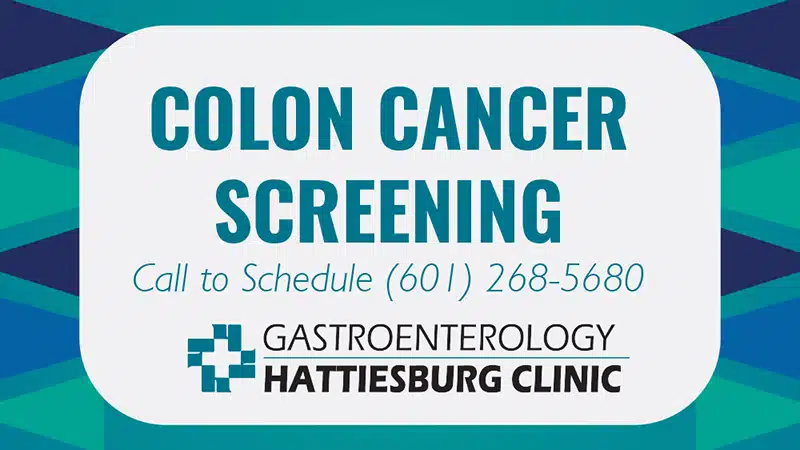The Importance of Getting a Colonoscopy
Hattiesburg Clinic Gastroenterology is dedicated to offering patients the most advanced diagnostic and treatment options for gastrointestinal conditions. Our board-certified gastroenterologists specialize in the prevention, evaluation and management of diseases affecting the digestive system, including disorders of the esophagus, stomach, small and large intestine (colon), liver, gallbladder and pancreas.
Why Getting Screened Matters:
As one of the most common cancers worldwide, colorectal cancer carries a high mortality rate if not identified and treated early. Routine screenings help detect precancerous polyps, which can be removed before they develop into cancer, significantly reducing the risk of disease progression. Colorectal cancer remains one of the most preventable cancers, yet many cases go undetected due to a lack of routine screenings.
Rebecca E. Browning, DO, MS, a gastroenterologist at Hattiesburg Clinic, emphasizes the urgency of screening, stating,“Colon cancer often has no symptoms in its early stages. This is why regular screenings are critical. Regular colon cancer screenings save lives. Early detection means early treatment, which leads to better outcomes.”
Colorectal cancer rates among younger adults continue to rise. Colon cancer screening is an essential tool in the fight against colorectal cancer.
How Colonoscopies Play a Role:
A routine colonoscopy is key to early detection and prevention of colorectal cancer. This procedure involves using a thin, flexible tube with a camera to examine the colon and rectum for abnormalities. If precancerous polyps are discovered, they can be removed immediately, reducing the likelihood of cancer development.
“Many people avoid a colonoscopy due to fear of discomfort, but the procedure is quick, with minimal discomfort, and can prevent a disease that is much harder to treat in later stages,” Dr. Browning states.
Schedule Your Screening Today:
Medical experts recommend individuals at average risk begin screening at age 45, while those with risk factors, such as a family history of colorectal cancer, inflammatory bowel disease (IBD) or genetic conditions, should start even earlier. Recognizing symptoms and consulting with a health care provider about screening options can be lifesaving.
At Hattiesburg Clinic Gastroenterology, our experienced team ensures patients receive customized care, from initial consultations to treatment planning. If cancer is detected, our team collaborates with oncologists to develop a personalized treatment plan. Appointments are available at our locations in Columbia, Ellisville, Hattiesburg, Laurel, McComb, Picayune and Wiggins. To schedule an appointment, call (601) 268-5680 or visit www.hattiesburgclinic.com/gastroenterology.
Providers at Hattiesburg Clinic Gastroenterology include: Kevin B. Barker, MD; Kevin P. Blanchard, MD; R. Seth Brown, DO; Rebecca E. Browning, DO, MS; Sean D. Fink, MD; Porter H. Glover, MD; Michael A. Goebel, MD; Gregory R. Owens, MD; Joseph P. Phillips, MD; Jessica C. Jones, ANP; Vani Naraharisetty, PA-C, PhD; Susan R. Oglesbee, FNP; and Anna L. Williamson, FNP.
###
About Hattiesburg Clinic Gastroenterology:
Hattiesburg Clinic Gastroenterology is dedicated to providing patients access to the most advanced technology and highest quality care for conditions of the gastrointestinal tract. We offer expertise in clinical services that focus on conditions involving the digestive system. Our board-certified gastroenterologists specialize in preventing, evaluating and treating diseases of the esophagus, stomach, small and large intestine (colon), liver, gallbladder and pancreas.
About Hattiesburg Clinic:
Hattiesburg Clinic is Mississippi’s largest privately-owned, multispecialty clinic. Founded in 1963, Hattiesburg Clinic has expanded to include over 450 physicians and providers, along with 2,500 employees, serving patients across more than 17 counties in Mississippi. Hattiesburg Clinic is committed to being the health care provider of choice in the communities we serve.
